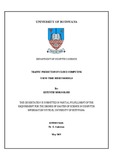Please use this identifier to cite or link to this item:
http://hdl.handle.net/10311/1469| Title: | Traffic prediction in cloud computing using time series models |
| Authors: | Mokgolodi, Kefentse |
| Keywords: | Cloud computing traffic congestion traffic management traffic prediction models time series models |
| Issue Date: | 3-Aug-2016 |
| Abstract: | The concept of Cloud Computing has brought a new dimension in the IT industry by offering online services to the international community on pay-as-you go basis. The architecture allows the clients to pay for what they use, minimizing the operational costs and leaving the hassle of system support to the service providers. Although cloud computing is a good and an attractive concept to the business community; it still has some challenges such as traffic management that need to be addressed. Most network service providers experience traffic congestion when messages arrive and queue at the service point due to limited processing capacity. That is what this research intends to mitigate by proposing a proactive traffic prediction model that would play a role in congestion control and estimation of accurate future resource demand in order to achieve guaranteed Quality of Service (QoS) rather than depending on reactive resource provisioning models. For this research, four time series models being Single Exponential Smoothing (SES), Double Exponential Smoothing (DES), Triple Exponential Smoothing (TES) and Autoregressive Integrated Moving Average (ARIMA) are compared in order to identify the one that can accurately predict the future performance of an IaaS cloud provider. The research is based on restricted traffic measurements which consist of the number of users and the amount of downloaded data taken from CAIDA database. More emphasis is put on the amount of traffic that goes through cloud network. The measurements used have monthly and yearly data making it a total of four (4) datasets. All the coding, testing of the hypothesis and the statistical work of the project are performed using R- programming language. From the study, the predictions of ARIMA are more accurate as compared to those of others and have smallest RMSE and MAE. It was also observed that all the models perform better on monthly data as compared to yearly data. |
| Description: | A dissertation submitted to the Dept. of Computer Science, Faculty of Science, University of Botswana in partial fulfilment of the requirement of the degree of Master of Science. Citation: Mokgolodi, K. (2015) Traffic prediction in cloud computing using time series models, University of Botswana |
| URI: | http://hdl.handle.net/10311/1469 |
| Appears in Collections: | Masters Dissertations |
Files in This Item:
| File | Description | Size | Format | |
|---|---|---|---|---|
| Mokgolodi_Unpublished (MSc)_2015.pdf | 2.53 MB | Adobe PDF |  View/Open |
Items in DSpace are protected by copyright, with all rights reserved, unless otherwise indicated.
